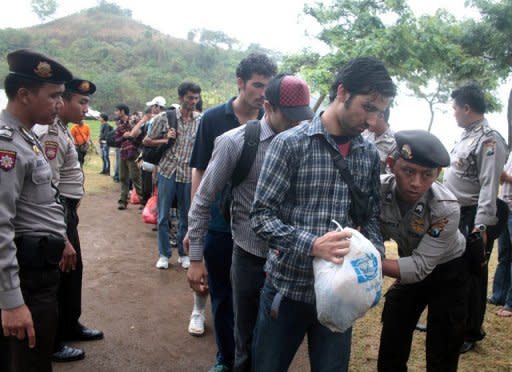Australia moves to send boatpeople offshore
Australia will move to send asylum-seekers to the Pacific states of Nauru and Papua New Guinea to deter boatpeople from risking their lives at sea, Prime Minister Julia Gillard said Monday. The decision came after an expert panel headed by former defence chief Angus Houston said Canberra should introduce greater disincentives to stop would-be refugees from paying people-smugglers to bring them by boat to Australia. The move is a political compromise by Gillard, who had resisted reopening the centres on Nauru and PNG in favour of a new arrangement with Malaysia that was at first struck down by the High Court and later rejected by parliament. But she said she needed to act to stop people drowning en route to Australia and she hoped that parliament would pass amended legislation this week. "If the opposition co-operates, the minister would then make the relevant determinations for processing on Nauru and PNG immediately," she said. Immigration Minister Chris Bowen said if the legislation was passed, the plans would have to be approved by the PNG and Nauruan governments. But he warned: "From this point forward, anybody who comes to Australia by boat runs the risk of being transferred to an offshore processing place." The prime minister said the government had endorsed in principle all recommendations in the report, including that Australia's annual humanitarian intake be increased from the current 13,750 to 20,000. The much-awaited independent report also called on Canberra to work closely with Indonesia, a transit country for many boatpeople, and Malaysia to stem the influx of maritime arrivals. Gillard's speech came as police in Indonesia revealed they had arrested another 150 Afghan and Pakistani nationals who were planning to make the dangerous trip by boat to Australia. More than 100 boats carrying over 7,500 suspected asylum-seekers have arrived in Australia so far this year, after the government failed to pass legislation aimed at deterring them by sending them to Malaysia. The so-called "Malaysia solution" would have seen boatpeople arriving in Australia transferred to the Southeast Asian nation, with Canberra resettling thousands of that country's registered refugees in return. The proposal was scuttled by the opposition and the Greens, who refused to pass laws allowing off-shore processing, prompting the government to ask Houston to review the policy in hopes of breaking the political deadlock. His panel recommended the government urgently reopen processing centres on the tiny Pacific island state of Nauru and on Papua New Guinea's Manus Island as a "circuit breaker" to the current surge in arrivals. Under this arrangement, those arriving by boat will be moved offshore and only moved back to Australia after spending the same amount of time there as they would have had they waited at a refugee resettlement place elsewhere. While Australia remains a minor destination country for asylum-seekers, receiving just 2.5 percent of global claims in 2011, some 964 asylum-seekers and crew have lost their lives at sea while en route since 2001. Of those, some 604 have perished since October 2009. "And we were dismayed to learn this morning that another 67 asylum-seekers are believed to be missing," Houston said in reference to a boat that reportedly left Indonesia in late June and has not been heard from since. "Like all Australians, we are deeply concerned about this tragic loss of life at sea," he said. "To do nothing is unacceptable." The conservative opposition said the report backed its policy to reopen Nauru, and highlighted its reservations about the Malaysia deal which the panel said had potential but could be strengthened to better protect human rights. But Greens leader Christine Milne attacked the findings as "cruel", saying they would potentially "set up a chain of detention centres right across the Pacific".



